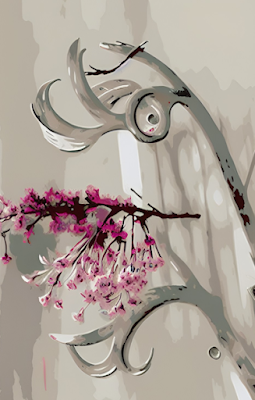While I was in Italy this spring I was surprised to see the pervasiveness of Bob Dylan books, art and music. There was a Dylan Retrospectum (art) in Rome, and books about or by Dylan featured in every bookstore. I struck up a conversation with a craft beer brewer in Parma regarding this observation, and he noted that it's not just Bob Dylan that America has exported, but Pop Culture in general.
This notion of American pop culture as a product being exported led to my noticing an increasing amount of commentary about the widespread dissatisfaction with the products Hollywood has been feeding us over the past decade or more. Here are some thoughts generated by feeding a sentence into ChatGPT, regurgitated in essay form.
In recent years, America's culture industries have faced a formidable challenge, grappling with the effects of decay, monopolization, and increasing bureaucracy. As the pursuit of profit has intensified, creativity has become stifled, leading to a worrying decline in the quality and diversity of cultural productions.
Let's examine the claim that America's culture industries have been transformed into anti-competitive, risk-averse monopolists, suffocating real creativity under the weight of mind-numbing and politically driven bureaucracy.
The rise of corporate giants within the culture industries (esp. Hollywood, literature, music) has undoubtedly fostered a monopolistic environment. Large media conglomerates have acquired numerous entertainment companies, consolidating their control over various creative outlets, from music and film to television and publishing. This monopolization has led to a lack of competition, as smaller players struggle to compete in an industry dominated by a select few. As a result, fresh and daring ideas are often sidelined in favor of formulaic, mass-appealing content that guarantees a return on investment.
Furthermore, the fear of taking risks has permeated the culture industries. Executives, driven by the pressure to maximize profits, tend to prefer established franchises and sequels, diminishing the opportunities for originality and innovative storytelling. This risk-averse approach stifles the potential for groundbreaking works of art and entertainment that push the boundaries of creativity.
To compound the problem, culture industries have become entangled in layers of bureaucracy. The quest for efficiency and streamlining often results in cumbersome approval processes and decision-making hierarchies that slow down productions and impede the free flow of ideas.
The weight of bureaucracy also affects the individual creatives, subjecting them to creative restrictions and inhibiting their ability to express themselves fully. The prioritization of market research and focus groups over genuine artistic vision further exacerbates the problem, leading to a homogenization of content and an erosion of creativity.
Moreover, the rising politicization of the culture industries has added another layer of complexity. In an attempt to appeal to specific demographics or avoid controversy, creative decisions are sometimes shaped by political considerations rather than artistic merit. This approach may lead to watered-down narratives, sanitization of historical events, or the avoidance of sensitive issues, ultimately undermining the power of storytelling to address important societal challenges.
In conclusion, the decay of America's culture industries can be attributed to a combination of anti-competitive monopolistic practices, risk aversion, and the burdensome bureaucracy they have imposed on their productions. Creativity, once the driving force behind cultural innovation, is now suffocating under the weight of profit-driven decision-making and politically motivated constraints. To revitalize the culture industries and foster an environment of genuine creativity, it is crucial to address these issues, encourage healthy competition, and prioritize artistic vision over short-term gains. Only then can American culture industries regain their vibrancy and contribute meaningfully to the enrichment of global artistic expression.
* * *
Here's the prompt I used to produce the above brief essay: "As America’s culture industries have decayed into anti-competitive, risk-averse monopolists, they have imposed layers upon layers of mind-numbing and increasingly politicised bureaucracy on their productions that make real creativity all but impossible." I pulled it from a much longer essay titled America's pop-culture armageddon by David Samuel at Unherd.
In short, the more that is at stake, the less people are willing to take risks. And because the giants control the channels of distribution, the most creative, outside-the-box original ideas never see the light of day.
* * *
Where things go from here is anyone's guess. What do you think?












No comments:
Post a Comment